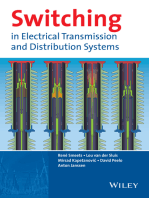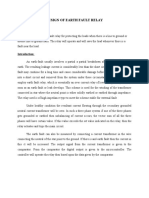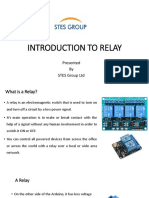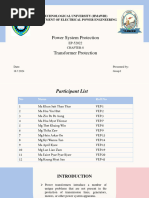0 ratings0% found this document useful (0 votes)
133 viewsAssignment 3 Power System Protection
This document discusses permissive overreaching transfer trip (POTT), which increases security on direct transfer trip systems by using a directional relay as a fault detector and permissive interlocking to prevent inadvertent tripping, allowing a trip signal to be sent to the remote end only if the local overreaching relay operates due to an internal fault. POTT offers advantages like being more commonly used, less expensive than blocking schemes, and not requiring coordination with adjacent line blocking relays, but its settings are more difficult than directional comparison blocking.
Uploaded by
WM ShahrulfarhCopyright
© Attribution Non-Commercial (BY-NC)
Available Formats
Download as PPTX, PDF, TXT or read online on Scribd
0 ratings0% found this document useful (0 votes)
133 viewsAssignment 3 Power System Protection
This document discusses permissive overreaching transfer trip (POTT), which increases security on direct transfer trip systems by using a directional relay as a fault detector and permissive interlocking to prevent inadvertent tripping, allowing a trip signal to be sent to the remote end only if the local overreaching relay operates due to an internal fault. POTT offers advantages like being more commonly used, less expensive than blocking schemes, and not requiring coordination with adjacent line blocking relays, but its settings are more difficult than directional comparison blocking.
Uploaded by
WM ShahrulfarhCopyright
© Attribution Non-Commercial (BY-NC)
Available Formats
Download as PPTX, PDF, TXT or read online on Scribd
You are on page 1/ 7
Assignment 3
Power System Protection
Permissive Overreaching Transfer Trip
Name: Wan Mohd Shahrulfarh Bin Wan Shamsuddin
Student ID: EP078782
Lecturer: Prof. Madya Dr. Izham Bin Zainal Abidin
How It Works?
• To increase the security on direct transfer trip
(DTT)
• Directional relay act as fault detector
• Permissive interlock to prevent inadvertent
trip
• Provide tripping function. A trip signal is tuned
to different frequencies and only respond to
remote transmitter’s signal
• Referring to figure, overreaching relay 21-10 &
21-20 will send tripping signal to remote end
• Overreaching relay will operate due to internal
fault
• If local overreaching relay operates & tripping
signal received, a trip will be initiated
• It will caused 85-1 G2 to drop out ant 85-1 T2 to
pick up
Advantages
• More Commonly used
• Less expensive
• Overreaching relay only has to see in front of
it compared to blocking scheme
• Do not have to coordinate with blocking relay
from adjacent line
Disadvantages
• Not only local relay operate on local circuit
breaker
• The setting is more difficult compared to
directional comparison blocking
Refferences
• S.H Horowitz and A.G. Phadke Text Book
• http://ece.uprm.edu/~lorama/Tema
%2012.pdf
You might also like
- Power System Structure: Dr. Mohammed HajahmedNo ratings yetPower System Structure: Dr. Mohammed Hajahmed48 pages
- Hands On Training On Transformer Protection Relays80% (5)Hands On Training On Transformer Protection Relays22 pages
- Islandingdetectionmethods 170622010343 PDFNo ratings yetIslandingdetectionmethods 170622010343 PDF15 pages
- Radial Feeder Protection: by N.Sarveshwar G.Ravikumar Panimalar Institute of Technology100% (1)Radial Feeder Protection: by N.Sarveshwar G.Ravikumar Panimalar Institute of Technology35 pages
- Transmission Line Protection PrinciplesNo ratings yetTransmission Line Protection Principles10 pages
- High Voltage, Ship's Electrical Networks Sample QuestionnaireNo ratings yetHigh Voltage, Ship's Electrical Networks Sample Questionnaire13 pages
- Mains Over Voltage and Under Voltage Protection Circuit100% (1)Mains Over Voltage and Under Voltage Protection Circuit15 pages
- Long Transmission Lines: Since Long Lines Are Highly Subjected To Power Swings (Load SheddingNo ratings yetLong Transmission Lines: Since Long Lines Are Highly Subjected To Power Swings (Load Shedding4 pages
- Lessons Learned Document Library-LL 20130401 Transmission Relaying Undesired BlockingNo ratings yetLessons Learned Document Library-LL 20130401 Transmission Relaying Undesired Blocking2 pages
- Introduction To Relay: Presented by STES Group LTDNo ratings yetIntroduction To Relay: Presented by STES Group LTD18 pages
- 1stintroduction of Protective Relaying System-1No ratings yet1stintroduction of Protective Relaying System-18 pages
- Power System Protection and Switchgear: Current Based Relaying Scheme-IVNo ratings yetPower System Protection and Switchgear: Current Based Relaying Scheme-IV15 pages
- Network Layer Security Protocols in Wireless Sensor NetworksNo ratings yetNetwork Layer Security Protocols in Wireless Sensor Networks20 pages
- Computer Networks and Internet TechnologiesNo ratings yetComputer Networks and Internet Technologies28 pages
- PSP 2nd Sem (Chapter 8) Presented by Group 1No ratings yetPSP 2nd Sem (Chapter 8) Presented by Group 136 pages
- Protection Signalling: Directional Comparison Distance Protection SchemesNo ratings yetProtection Signalling: Directional Comparison Distance Protection Schemes12 pages
- Types of Neutral Earthing in Power Distribution (Part 1) - EEPNo ratings yetTypes of Neutral Earthing in Power Distribution (Part 1) - EEP5 pages
- Switching in Electrical Transmission and Distribution SystemsFrom EverandSwitching in Electrical Transmission and Distribution Systems
- Hands On Training On Transformer Protection RelaysHands On Training On Transformer Protection Relays
- Radial Feeder Protection: by N.Sarveshwar G.Ravikumar Panimalar Institute of TechnologyRadial Feeder Protection: by N.Sarveshwar G.Ravikumar Panimalar Institute of Technology
- High Voltage, Ship's Electrical Networks Sample QuestionnaireHigh Voltage, Ship's Electrical Networks Sample Questionnaire
- Mains Over Voltage and Under Voltage Protection CircuitMains Over Voltage and Under Voltage Protection Circuit
- Long Transmission Lines: Since Long Lines Are Highly Subjected To Power Swings (Load SheddingLong Transmission Lines: Since Long Lines Are Highly Subjected To Power Swings (Load Shedding
- Lessons Learned Document Library-LL 20130401 Transmission Relaying Undesired BlockingLessons Learned Document Library-LL 20130401 Transmission Relaying Undesired Blocking
- Introduction To Relay: Presented by STES Group LTDIntroduction To Relay: Presented by STES Group LTD
- Power System Protection and Switchgear: Current Based Relaying Scheme-IVPower System Protection and Switchgear: Current Based Relaying Scheme-IV
- Network Layer Security Protocols in Wireless Sensor NetworksNetwork Layer Security Protocols in Wireless Sensor Networks
- Protection Signalling: Directional Comparison Distance Protection SchemesProtection Signalling: Directional Comparison Distance Protection Schemes
- Types of Neutral Earthing in Power Distribution (Part 1) - EEPTypes of Neutral Earthing in Power Distribution (Part 1) - EEP
- Analog Dialogue Volume 46, Number 1: Analog Dialogue, #5From EverandAnalog Dialogue Volume 46, Number 1: Analog Dialogue, #5



























































